- Focus and Scope
- Section Policies
- Peer Review Process
- Publication Frequency
- Open Access Policy
- Archiving
- Policy of Screening for Plagiarism
- Manuscript Withdrawal
- Correction and Retraction Policies
Focus and Scope
J-PEK (Jurnal Pembelajaran Kimia) publishes peer review articles in the area of chemistry education including research results, review or short communication, conceptual ideas in chemistry education, and others relevant aspects of chemistry education disciplines. The published articles cover the following themes:
- Models of chemistry teaching and learning
- Assessment in chemistry teaching and learning
- Media for chemistry teaching and learning
- ICT in chemistry teaching and learning
- Learning outcomes and theoretical chemistry teaching and learning
- Other in-depth analysis of chemistry teaching and learning
Section Policies
Chemistry Didactica
Chemistry for Society
Article Review
Peer Review Process
J-PEK (Jurnal Pembelajaran Kimia) blind peer review process for each manuscript which involves editors and 2 (two) reviewers.
Publication Frequency
June and December
Open Access Policy
This journal provides immediate open access to its content on the principle that making research freely available to the public supports a greater global exchange of knowledge.
Archiving
This journal utilizes the LOCKSS system to create a distributed archiving system among participating libraries and permits those libraries to create permanent archives of the journal for purposes of preservation and restoration. More...
Policy of Screening for Plagiarism
Papers submitted to J-PEK (Jurnal Pembelajaran Kimia) will be screened for plagiarism using Turnitin plagiarism detection tools. J-PEK (Jurnal Pembelajaran Kimia) will immediately reject papers leading to plagiarism or self-plagiarism.
Before submitting articles to reviewers, those are first checked for similarity/plagiarism tool, by a member of the editorial team. The papers submitted to J-PEK (Jurnal Pembelajaran Kimia) must have similarity level less than 20%Manuscript Withdrawal
Manuscript withdrawal is strongly discouraged. It is a waste of valuable resources that the publisher put. If the author still requests withdrawal of their manuscript, the following guidelines have to be followed
- Manuscript withdrawal will be permitted only for the most compelling and unavoidable reasons. It is unacceptable to withdraw a manuscript from a journal because another journal is accepting it;
- The author should submit a request to the editorial office as a letter signed by all authors stating the complete cause that led to the step of manuscript withdrawal;
- Authors must not assume that their manuscript has been withdrawn until they have received appropriate notification to this effect from the editorial office.
Correction and Retraction Policies
J-PEK (Jurnal Pembelajaran Kimia) committed to upholding the integrity of the literature and publishes Errata, Expressions of Concerns or Retraction Notices dependent on the situation and following the COPE Retraction Guidelines. J-PEK (Jurnal Pembelajaran Kimia) will be consider to retract in the publication if:
- They have clear evidence that the findings are unreliable, either as a result of misconduct (e.g. data fabri-cation) or honest error (e.g. miscalculation or experimental error)
- The findings have previously been published elsewhere without proper cross referencing, permission or justification (i.e. cases of redundant publication)
- It constitutes plagiarism
- It reports unethical research
The mechanism of retraction follows the Retraction Guidelines of COPE Retraction Guidelines.










